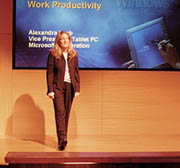

Current Cover
|
|
|
|
|
|
 By Conrad H. Blickenstorfer By Conrad H. BlickenstorferIssue 45
Microsoft's third attempt at bringing pen computing to the masses is almost ready for release. But will the Windows XP Tablet PC edition succeed where its predecessors failed?I am writing this column a week after I returned from the Microsoft Tablet PC Reviewers Workshop that took place in Seattle, Wash., June 4th and 5th. Microsoft put on a good show and made every effort to explain the concept to a relatively exclusive group of journalists. Even Bill Gates himself made an appearance and talked to us about the Tablet PC for almost an hour.The presentations by Microsoft's team were excellent, as were the explanatory handouts. The full-color Reviewer's Guide provided comprehensive information about the project, including a remarkably complete section on the history of pen computing. Each publication received an evaluation unit loaded with the current beta of the Tablet PC software. It is clear that the most influential software company in the world, and arguably in the entire computer industry, is serious about taking another crack at pen computing. Everything seems in place: a large development team at Microsoft, an impressive roster of hardware OEMs willing to build Tablet PCs, and Bill Gates fully behind the project. As a pen computing enthusiast I should be jumping with joy, and to some extent I am. But something just doesn't feel right. Ever since I got back I've been trying to figure out what it all means, what the actual impact of the Tablet PC will be. And what a "Tablet PC" is. 'Easy,' you might say. 'It's a computer in the form of a tablet. One without a keyboard.' Not necessarily. While the initial Tablet PC prototypes-the ones Bill Gates showed at Fall Comdex 2000 and 2001, the ones that were shown at various trade shows and developers conferences-were indeed pen slates, the current word from Redmond is that a Tablet PC doesn't necessarily have to be a slate. It could also be a notebook convertible, or just a notebook with the Tablet PC software, also known as Microsoft Windows XP Tablet PC Edition. So just like IBM's ThinkPad, which was originally conceived as a pen slate and then morphed into a line of notebook computers that had absolutely nothing to do with pads, the Tablet PC has already morphed from a slate computer into pretty much any PC that can accommodate a digitizer and run the Tablet PC edition of Windows XP. The Tablet PC now no longer describes a specific type of PC, a slate, but any computer with a pen input option and software extensions that work with the pen. As far as I am concerned, that is a pretty big difference. It's the difference between revolution and evolution. When the Tablet PC initiative was first announced, I saw it as a revolutionary attempt to advance the PC to the next level, and go after entirely new markets. I thought Microsoft had concluded that there wasn't much growth left in the stagnating PC and notebook business and that the Tablet PC was an attempt at exploring and mining new markets.
This statement, to me, provides insight into the changing nature of the Tablet PC. Handwriting and speech recognition are computer science problems, as is the introduction of an entirely new interface. To my way of thinking, incrementally improving the notebook is a fundamentally different task from introducing an entirely new computing platform. During the entire conference I sensed that this was in some way a confrontation between one of Bill Gates's dreams and the realities encountered by his Tablet PC team. Loeb referred to meetings with Gates, how excited he is about the technology and that he always wants more. It was then the task of her team to explain why some things had to be cut. It was therefore interesting to hear Bill Gate's thoughts about the project. He was introduced as "the biggest friend of the Tablet for the past three years. He has been all that for the past ten years. He has been an architect, a user, a tester, a supporter." Bill Gates, of course, is a level-headed man who can distinguish dreams from realities. He talked about how he had introduced some of America's most influential CEOs to the Tablet PCs and how they had liked the ink. Ink is important to Gates. "With paper you have immediacy," he said, and he talked about meetings where keyboards are not allowed and people have to use actual paper, "and then paper notes are not searchable, and by the time you look at them you don't know what you meant and they eventually get lost." He commented on the drawbacks of PCs, such as size and weight, but also the need to provide the ink experience in a full-power, no-compromises device. Bill Gates's goal, it appeared, is to make the advantages of paper--scribbling notes, highlighting things, annotating--available on a computer where that data becomes searchable and available for collaboration and sharing. The concept of sharing information seems very important to Gates. In addition to being able to share ink data, he described how they found that people used digital imaging, photos, more on tablets than on standard PCs, because tablets are for sharing whereas PCs are not. He also mentioned the usefulness of not having a keyboard in Asian markets: "Early reactions in China and Japan are quite phenomenal." Gates professed to be an ardent user of the Tablet PC. "I would not give up my tablet for anything," Gates said. "In meetings I sit there and have four notes windows open." Equally evident was his great personal interest in the project: "I fire off five messages a day to the Tablet group and ask them could you do this or that." Though Gates almost always referred to a tablet form factor, he also said the tablet he is currently using is, in fact, the same Acer TravelMate convertible that was handed out to the press. Almost apologetically he added: "Will they eventually get thinner and have longer battery life? Absolutely." He also implied he'd like to see tablet equivalents for all the notebook screen sizes people use now. Asked about his predictions for the Tablet PC, Gates offered, "The Tablet will shift the boundary what part of the market is portable and what is desktop. We have done everything to prime the pump. I see it catching on very very rapidly." The overall impression I got was that Bill Gates is really enamored with ink and the tablet approach, but that he is rational enough to listen to his teams. Plus he is, of course, fully aware of the pen computing failures of the past. Not that those failures would ever stop him: "I love dis-proven ideas... a lot of great ideas were tried and then rejected.... In the past a lot of the pieces, including ours, were just not there." And that, of course, is one of the big questions. There is no doubt that we've come a long way in terms of technology since the early failures of pen computing. However, it would be a big mistake to simply dismiss the first two iterations of Microsoft's pen extensions as kludgey add-ons. Anyone who was there knows that Microsoft was deadly serious with Windows for Pen Computing. The situation then was really quite similar to what the company later encountered when Netscape threatened to beat Microsoft on the Internet. For all anyone knew back in 1991, PenPoint was the future, and Microsoft had to put its best effort forward to counter that. Similarly, anyone who read the 525-page Programmer's Guide to Pen Services for Windows 95 knows that the second iteration was a serious effort as well. It's just that by then pen computing was no longer relevant and no one ever bothered to do much with those extensions. I do not have any doubt that Bill Gates believes in a true pen slate. I also have no doubt that he believes in ink as a data type. I am just afraid that there may be a dangerous dissonance between Gates' desire for such a product and the apparent fear of many involved in the project that it might result in another embarrassing pen computing flop. Boldly going ahead, or hedging the bets, that seems to be the question. - Conrad H. Blickenstorfer, a former corporate CIO, is editor-in-chief of Pen Computing Magazine and Publication Director of Digital Camera Magazine. He can be reached via e-mail at cb@pencomputing.com. |
 Alexandra Loeb's presentation provided some insight in Microsoft's rationales. The 14-year-Microsoft-veteran described some of today's challenges: information fatigue, data islands, no real collaboration and no real business process integration. She identified improved interfaces between people and computers as something that can dramatically fuel productivity gains. Among those interface improvements are speech and handwriting recognition, better LCDs, better graphics and a pen interface. "Face it, the keyboard isn't always the most comfortable mechanism," she said. It was equally clear that Loeb sees the solution not in some watered-down device. Her Tablet PC is "a laptop on steroids," she said. "It is absolutely a PC, there is no subset logic here." She described how her team looked at all the different situations where a traditional laptop may not be quite right and where people may pull out pen and paper instead. She described a slow and deliberate approach at addressing those scenarios, always making sure that they addressed real problems and that the approach really worked. "We were here to solve customer problems and not computer science problems," said Loeb.
Alexandra Loeb's presentation provided some insight in Microsoft's rationales. The 14-year-Microsoft-veteran described some of today's challenges: information fatigue, data islands, no real collaboration and no real business process integration. She identified improved interfaces between people and computers as something that can dramatically fuel productivity gains. Among those interface improvements are speech and handwriting recognition, better LCDs, better graphics and a pen interface. "Face it, the keyboard isn't always the most comfortable mechanism," she said. It was equally clear that Loeb sees the solution not in some watered-down device. Her Tablet PC is "a laptop on steroids," she said. "It is absolutely a PC, there is no subset logic here." She described how her team looked at all the different situations where a traditional laptop may not be quite right and where people may pull out pen and paper instead. She described a slow and deliberate approach at addressing those scenarios, always making sure that they addressed real problems and that the approach really worked. "We were here to solve customer problems and not computer science problems," said Loeb.